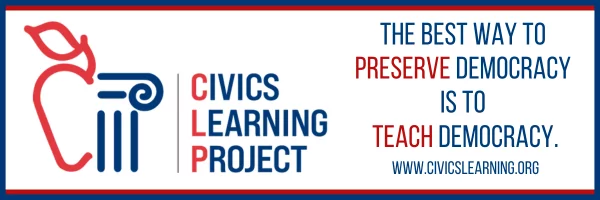CLP Current Event: March 19, 2019
Voting is the central task of citizens. What should be the criteria for voting? Is lowering the voting age being inclusive or clueless?
Brought to teachers by Susie Marcus, CLP consultant, with CLP staff.
News Sources
Lawmaker renews national debate over lowering national voting age, by Alicia Cohn, The Hill, March 10, 2019
“The Constitution does not prohibit states from setting a lower voting age, and some cities have considered or adopted legislation to lower the minimum voting age. Many states allow 16-year-olds to preregister to vote. Oregon is currently considering lowering the state’s minimum voting age from 18 to 16, according to CNN.”
What If High Schoolers Could Vote? We May Soon Find Out, by Lynsi Burton, Yes Magazine, March 7, 2019
“Indeed, Natalie Khalil, a senior at Lake Oswego High School, was only 17 when the Parkland shooting happened. As a first-generation American whose first memory at 7 or 8 years of age was participating in a protest advocating Palestinian rights, she was frustrated to know that she wouldn’t be old enough to vote in the 2018 midterm election.”
Ayanna Pressley is introducing legislation to lower the federal voting age, by Nik DeCosta-Klipa, boston.com, March 6, 2019
“Pressley’s amendment would only apply to elections for the U.S. House, U.S. Senate, and president. That’s because the Supreme Court ruled in 1970 that Congress had the authority to change the voting age for federal elections — but not for state and local elections (hence the necessity of the 26th Amendment).”
This is why 16-year-olds should be able to vote, by Scott Warren, New York Post, March 2, 2019
“Our youngest Americans, millennials and Generation Z, will comprise 37 percent of the 2020 electorate. In a promising sign, we’ve seen widespread youth activism since Parkland, mirroring the Vietnam-era activism that lowered the voting age to 18 nearly 50 years ago.”
CLP: Opinion
Questions to Consider
- What is the current minimum voting age?
- What is an appropriate voting age? 16? 18? 21? 25?
- Is age the primary criteria for being a responsible voter?
- What other criteria would you recommend?
- Why did the 26th amendment pass in 1971?
- What does the history of voting rights for African Americans and women tell us about the struggle for enfranchisement?
- What are other significant voting issues? Felon voting, gerrymandering. Voter suppression?
- What do supporters say about lowering the voting age to 16?
- What do opponents of lowering the voting age to 16 say?
- What is the key to making sound judgments?
- What is emotional maturity? What is peer pressure? How might these affect voting?
- Does the voting age relate to the smoking age? Drinking age? Driving age? Marriage age? Military enlistment age?
- What do other countries choose as the minimum voting age?
Background and More
Don’t lower the voting age, raise it, by J.K. Baltzersen, Enter Stage Right, March 11, 2019
The surprising consequence of lowering the voting age, by Jens Olav Dahlgaard, The Washington Post, March 1, 2018
Vote16USA: A Campaign To Lower The Voting Age, Generation Citizen, December 21, 2015
Studying teens’ emotional maturity gap, by Laura Rico, University of California, Irvine, October 12, 2009
The 26th Amendment, History.com, August 21, 2018
Voting Age Around the World, batchgeo
CLP: Map and listing of every country’s voting age, if compulsory and any unique qualifications
Lesson Plans
Are Teenagers Mature Enough to Vote?, VOA, March 28, 2019
CLP: Good vocabulary lesson for ELL
Lesson Plan: Are 16-year-olds mature enough to vote?, by Rachel Roberson, The Lowdown
CLP: Middle school
Constitutional and Legal Connections
Voting rights in the United States, Wikipedia
Oregon Connections
Oregon legislators float plan to lower voting age to 16, stiff opposition likely, by Ben Botkin, The Statesman Journal, February 18, 2019
Oregon State Social Science Standards
8.8 Evaluate information from a variety of sources and perspectives.
8.21 Analyze important political and ethical values such as freedom, democracy, equality and justice embodied in documents such as the Declaration of Independence, the United States Constitution, and the Bill of Rights.
8.26 Examine a controversial event, issue, or problem from more than one perspective.
HS.28 Evaluate how governments interact at the local, state, tribal, national, and global levels.
HS.33 Explain the role of government in various current events.
HS.35 Examine the pluralistic realities of society (e.g., race, poverty, gender and age), recognizing issues of equity, and evaluating need for change.
HS.59 Demonstrate the skills and dispositions needed to be a critical consumer of information.
HS.60. Analyze an event, issue, problem, or phenomenon from varied or opposing perspectives or points of view.
We the People Lesson Connections
Middle School, Level 2
- Unit 6, Lesson 29: What are the rights and responsibilities of citizenship?
- Unit 6, Lesson 30: How might citizens participate in civic affairs?
High School, Level 3
- Unit 6, Lesson 34: What is the importance of civic engagement to American constitutional democracy?
- Unit 6, Lesson 37: What key challenges does the United States face in the future?


